December 9th, 2014 § § permalink
 In a week when flaws in Rolling Stone’s reporting of a culture of rape on the University of Virginia campus created national headlines, the lapses of a single cultural reporter at the Wall Street Journal doesn’t seem to amount to a hill of beans. But it’s a story that is much buzzed about in theatrical circles, and perhaps throughout the field of the arts, with implications much greater than Joanne Kaufman’s self-appointed role as a serial “Broadway bolter,” who has accepted who knows how many complimentary tickets only to depart frequently at intermission.
In a week when flaws in Rolling Stone’s reporting of a culture of rape on the University of Virginia campus created national headlines, the lapses of a single cultural reporter at the Wall Street Journal doesn’t seem to amount to a hill of beans. But it’s a story that is much buzzed about in theatrical circles, and perhaps throughout the field of the arts, with implications much greater than Joanne Kaufman’s self-appointed role as a serial “Broadway bolter,” who has accepted who knows how many complimentary tickets only to depart frequently at intermission.
In a column last week, Kaufman declared:
I’m embarrassed by how unembarrassed I am to admit that the very next night, I took early leave of “The Country House,” and the following night of “It’s Only a Play.” If only. Don’t ask me what happened during the second acts of “Matilda,” “Kinky Boots,” “Pippin” and, reaching back a few seasons, “Boeing-Boeing” and “Billy Elliott. ” Really, I have no idea. But I am nothing if not cosmopolitan in my tastes, or distastes—French farces, English musicals set in gritty industrial cities, and American entertainments involving Charlemagne ’s Frankish kin.
I happen to believe that, for the regular theatregoer, there’s nothing wrong with leaving a show at intermission. You paid for the right to be there and if you’re miserable, it’s probably to your benefit and the benefit of the rest of the audience if you depart. It’s your right (so long as it’s not done mid-scene, which is far too disruptive) and frankly the rest of the audience and the actors are probably better off without your repeated loud sighs, your ongoing dialogue with the person you came with, or your snoring.
But anyone who is attending in a professional capacity, let alone someone with complimentary tickets, has to stick it out – because it’s their job, or simply good manners as a guest. If not, the tickets have been accepted under false pretenses and the individual’s credibility is damaged, if not destroyed.
 Now it’s important to note that in my circles, both personal and online, there seems to be little sympathy or tolerance for Kaufman’s recurring disappearing act. Other journalists have shot verbal arrows at her on Twitter, as have theatre professionals from every discipline in the field. She has been the subject of nothing less than ongoing ridicule, and she’s likely to be a longtime theatre punchline. Publicist Rick Miramontez (a friend and professional colleague) has had a blog post in which he calls out Kaufman go viral, in part because he lays bare her failings and also because many assume that p.r. people will kowtow to the media at all costs.
Now it’s important to note that in my circles, both personal and online, there seems to be little sympathy or tolerance for Kaufman’s recurring disappearing act. Other journalists have shot verbal arrows at her on Twitter, as have theatre professionals from every discipline in the field. She has been the subject of nothing less than ongoing ridicule, and she’s likely to be a longtime theatre punchline. Publicist Rick Miramontez (a friend and professional colleague) has had a blog post in which he calls out Kaufman go viral, in part because he lays bare her failings and also because many assume that p.r. people will kowtow to the media at all costs.
Miramontez wrote, as part of declaring that he would no longer invite Kaufman or provide her with complimentary tickets:
I couldn’t help but feel a bit like a chump for having accommodated the woman so many times over the years. Certainly every audience member, paid or comped, has the right to form whatever opinions they might about any production they see, but I don’t think it’s too much to expect those who attend on press tickets stay for the duration. Would a fine art writer only peer at half a canvas before deciding she’s bored and it’s time to move on? Does a music reporter think he can make an informed decision on an album if he only listens to a couple of tracks? Why would we accept such sheer laziness from our theatrical press?
Since others have effectively demolished Kaufman’s questionable professional ethics, I need not rehash them further. But let me go a step beyond.
Unlike bloggers with their own sites (say for example, me), journalists don’t simply write something and have it magically appear in print or online. There’s at least one editor and a copy editor who has seen the piece, and at a paper like the Wall Street Journal, probably more. So it’s important to note that Kaufman was not writing in a vacuum, but rather with the tacit approval of every staffer at the WSJ who got a glimpse of her piece. It’s more than a bit worrisome that no one at the paper apparently saw anything wrong with either Kaufman’s actions or her almost gleeful confession of her ethical gaffes. Frankly, why did this piece run at all?
While her piece was opinion rather than reportage, surely average readers may now wonder about the veracity of other WSJ writing – and that’s a shame, because I know many arts reporters at the paper and know them to operate with the highest integrity and profound respect for the arts. While I haven’t asked him, I can’t help but think that Kaufman’s actions are particularly galling to the WSJ’s drama critic Terry Teachout, especially as many accounts of the “Broadway bolter” incorrectly identified her as the WSJ’s theatre critic.
Should it be up to publicists to put Kaufman on the straight and narrow? Even if she does start paying for tickets, will her bosses only permit her to attend with a minder? Will she become a culture writer only on works of 90 minutes or less, since that’s all she can tolerate? Perhaps she’ll need an ankle bracelet so they can be certain that she stays for the duration.
In a moment of sympathy, I’m willing to suggest that perhaps Kaufman, and her editors, fell prey to aping the lingua franca of the internet: snark (see prior paragraph as an example). Maybe the flip, contrarian tone was an effort to mimic the style of bloggers and tweeters. But in the august, conservative WSJ, it stuck out like a sore thumb – and while it may well have tapped into a new audience, it did so only to be met by significant derision. It seems that, for all of the angst surrounding critical arts coverage in general, Kaufman had truly crossed a bridge too far by slamming work she hadn’t even bothered to assess in full. If anything, she proved that there is still a place and desire for arts journalism, but that she may have no place in it.
 On the same subway ride during which I read Kaufman’s piece, I also read an essay by Tim Walker, who has recently been let go from his position as theatre critic for London’s Sunday Telegraph. Understandably troubled by the ongoing culling of arts critics in London (an issue in the U.S. as well, and a concern I share), he cites a conversation about criticism he recently had:
On the same subway ride during which I read Kaufman’s piece, I also read an essay by Tim Walker, who has recently been let go from his position as theatre critic for London’s Sunday Telegraph. Understandably troubled by the ongoing culling of arts critics in London (an issue in the U.S. as well, and a concern I share), he cites a conversation about criticism he recently had:
One leading impresario told me he looked around at the motley crowd that had turned up to sit in judgment on one of his productions and he realised he didn’t know a single one of them. “They were young, spotty, out of their comfort zones and clearly exhausted, having been diverted at the last minute from other tasks at their hard-pressed media organisations,” he lamented. “Honestly, after all the work we had put in on our side, and all the investment, it felt like a slap in the face.”
The conventional wisdom is that readers of theatre reviews are migrating – along with the advertising – to online, but who, honestly, can name an internet critic who has the authority of, say, the Guardian’s Michael Billington? Or – until he also joined the exodus – the Telegraph’s Charles Spencer?
While he has given himself the cover of quoting someone else, Walker seems to side with his unnamed commentator. He also mimics someone in a vastly more significant situation, namely the prosecutor in the Michael Brown case, who repeatedly spoke of the failings of social media before revealing the wholly inadequate results of the grand jury findings. Two decades after the advent of general internet use, nearly a decade after the advent of social media, one can no longer make the case for journalism, or any endeavor, by slamming the reality of how we communicate now and continuing to proclaim the superiority of the “mainstream media.” Walker’s legitimate concerns about the state of arts criticism are undone by condescension, just as Kaufman skewered herself with her own glee over her risable actions.
Arts journalism is no different from any other facet of journalism today in that many of the old structures are falling and the future is evolving at an exceptionally fast pace, chewing up both practices and people in the process. But the bottom line is that if you find the rug pulled out from under you, it won’t serve the field to have you bemoaning the new and ever-changing normal; if you still have a platform, use it to imagine a better, sustainable future. And by all means, if you have a platform, use it professionally and ethically, lest you go out on a limb and saw it off behind yourself.
December 3rd, 2014 § § permalink
Not to dash anyone’s dreams, but I think it’s fair to say that the majority of the hundreds of thousands of students who participate in high school theatre annually will not go on to professional careers in the arts. The same holds true for the student musicians in orchestras, bands and ensembles. They all benefit from the experience in many ways: from the teamwork, the discipline and the appreciation of the challenge and hard work that goes into such endeavors, to name but a few attributes.
But for some students, those high school experiences may be the foundation of a career, of a life, and it’s an excellent place for skills and principles to be taught. As a result, I have, on multiple occasions, heard creative artists talk about their wish that students could learn about the basics of copyright, which can for writers, composers, designers, and others be the root of how they’ll be able to make a life in the creative arts, how their work will reach audiences, how they’ll actually earn a living.
I’m not suggesting that everyone get schooled in the intricacies of copyright law, but that as part of the process of creating and performing shows, students should come to understand that there is a value in the words they speak and the songs they sing, a concept that’s increasingly frayed in an era of file sharing, sampling, streaming and downloading. Creative artists try to make this case publicly from time to time, whether it’s Taylor Swift pulling her music from Spotify over the service’s allegedly substandard rate of compensation to artists or Jason Robert Brown trying to explain why copying and sharing his sheet music is tantamount to theft of his work. But without an appreciation for what copyright protects and supports, it’s difficult for the average young person to understand what this might one day mean to them, or to the people who create work that they love.
* * *
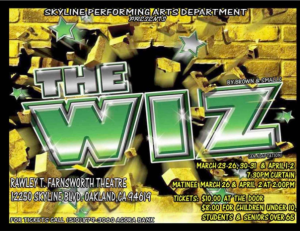 All of this brings me to a seemingly insignificant example, that of a production of the musical The Wiz at Skyline High School in Oakland, California back in 2011. Like countless schools, Skyline mounted a classic musical for their students’ education and enjoyment, in this case playing eight performances in their 900 seat auditorium, charging $10 a head. These facts might be wholly unremarkable, except for one salient point: the school didn’t pay for the rights to perform the show.
All of this brings me to a seemingly insignificant example, that of a production of the musical The Wiz at Skyline High School in Oakland, California back in 2011. Like countless schools, Skyline mounted a classic musical for their students’ education and enjoyment, in this case playing eight performances in their 900 seat auditorium, charging $10 a head. These facts might be wholly unremarkable, except for one salient point: the school didn’t pay for the rights to perform the show.
The licensing house Samuel French only learned this year about the production, and consequently went about the process of collecting their standard royalty. Over the course of a few months, French staff corresponded with school staff and volunteers connected with the drama program, administration and ultimately the school system’s attorney. French’s executive director Bruce Lazarus shared the complete correspondence with me, given my interest in authors’ rights and in school theatre.
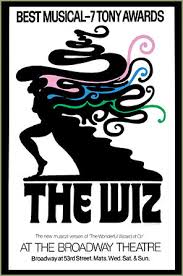 I’m very sympathetic to any school that wants to give their students a great arts experience, and so the drama advisor’s discussion in the correspondence of limited resources and constrained budgets really struck me. Oakland is a large district and Skyline is an inner-city school; I have no reason to doubt their concerns about the quoted royalty costs for The Wiz being beyond their means. But their solution to this quandary took them off course.
I’m very sympathetic to any school that wants to give their students a great arts experience, and so the drama advisor’s discussion in the correspondence of limited resources and constrained budgets really struck me. Oakland is a large district and Skyline is an inner-city school; I have no reason to doubt their concerns about the quoted royalty costs for The Wiz being beyond their means. But their solution to this quandary took them off course.
Skyline claims that they did their own “adaptation” of The Wiz, securing music online and assembling their own text, under the belief that this released them from any responsibility to the authors and the licensing house. While they tagged their ads for the show with the word “adaptation,” it’s a footnote, and if one looks at available photos or videos from the production, it seems pretty clear that their Wiz is firmly rooted in the original material, even the original Broadway production. Surely the text was a corruption of the original and perhaps songs were reordered or even eliminated. It’s also worth noting that Skyline initially inquired about the rights, but then opted to do the show without an agreement.
* * *
OK, so one school made a mistake over three and a half years ago – what’s the big deal? That brings me to the position taken by the Oakland Unified School District regarding French’s pursuit of appropriate royalties. OUSD has completely denied that French has any legitimate claim per their attorney, Michael L. Smith. In a mid-October letter, Mr. Smith cites copyright law statute of limitations, saying that since it has been more than three years since the alleged copyright violation, French is “time barred from any legal proceeding.” Explication of that position constitutes the majority of the letter, save for a phrase in which Mr. Smith states, “As you are likely aware, there are limitations on exclusive rights that may apply in this instance, including fair use.”
As I’m no attorney, I can’t research or debate the fine points of statutes of limitation, either under federal or California law. However, I’ve read enough to understand that there’s some disagreement within the courts, as to when the three-year clock begins on a copyright violation. It may be from the date of the alleged infringement itself, in this case the date of the March and April 2011 performances, but it also may be from the date the infringement is discovered, which according to French was in September 2014. We’ll see how that plays out.
The passing allusion to fair use provisions is perhaps of greater interest in this case. Fair use provides for the utilization of copyrighted work under certain circumstances in certain ways. Per the U.S. Copyright office:
Copyright Law cites examples of activities that courts have regarded as fair use: “quotation of excerpts in a review or criticism for purposes of illustration or comment; quotation of short passages in a scholarly or technical work, for illustration or clarification of the author’s observations; use in a parody of some of the content of the work parodied; summary of an address or article, with brief quotations, in a news report; reproduction by a library of a portion of a work to replace part of a damaged copy; reproduction by a teacher or student of a small part of a work to illustrate a lesson; reproduction of a work in legislative or judicial proceedings or reports; incidental and fortuitous reproduction, in a newsreel or broadcast, of a work located in the scene of an event being reported.”
* * *
Rather than parsing the claims and counterclaims between Samuel French and the school district, I consulted an attorney about fair use, though in the abstract, not with the specifics of the show or school involved. I turned to M. Graham Coleman, a partner at the firm of Davis Wright Tremaine in their New York office. Coleman works in all legal aspects of live theatre production and counsels clients on all aspects of copyright and creative law. He has also represented me on some small matters.
“In our internet society, “ said Coleman, “there is a distortion of fair use. We live in a world where it’s so easy to use someone’s proprietary material. The fact that you based work on something else doesn’t get you off the hook with the original owner.”
Without knowing the specifics of Skyline’s The Wiz, Coleman said, “They probably edited, they probably varied it, but they probably didn’t move it into fair use. Taking a protectable work and attempting to ‘fair use’ it is not an exercise for the amateur.”
Regarding the language in fair use rules that cite educational purposes, Coleman said, “Regardless of who you are, once you start charging an audience admission, you’re a commercial enterprise. Educational use would be deemed to mean classroom.”
While Coleman noted that the cost of pursuing each and every copyright violation by schools might be cost prohibitive for the rights owners, he said that, “It becomes a matter of principle and cost-effectiveness goes out the window. They will be policed. Avoiding doing it the bona fide way will catch up with you.”
* * *
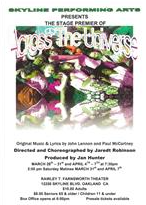 That’s where the Skyline scenario gets more complicated – because their “adaptation” of The Wiz wasn’t their only such appropriation of copyrighted material. In 2012, the school produced a stage version of Julie Taymor’s Beatles-inspired film Across The Universe, billing it accordingly and crediting John Lennon and Paul McCartney as the songwriters. The problem is, there is no authorized stage adaptation of the film, although there have been intermittent reports that Taymor is contemplating her own, which her attorney affirmed to me. In this case, the Skyline production is still within the statute of limitations for a copyright claim.
That’s where the Skyline scenario gets more complicated – because their “adaptation” of The Wiz wasn’t their only such appropriation of copyrighted material. In 2012, the school produced a stage version of Julie Taymor’s Beatles-inspired film Across The Universe, billing it accordingly and crediting John Lennon and Paul McCartney as the songwriters. The problem is, there is no authorized stage adaptation of the film, although there have been intermittent reports that Taymor is contemplating her own, which her attorney affirmed to me. In this case, the Skyline production is still within the statute of limitations for a copyright claim.
 I attempted to contact both the principal of Skyline High and the superintendent of the school district about this subject, ultimately reaching the district’s director of communications Troy Flint. In response to my questions about The Wiz, Flint said, “We believe that we were within our rights. I can’t go into detail because I’m not prepared to discuss our legal strategy. We believe this use was permissible.”
I attempted to contact both the principal of Skyline High and the superintendent of the school district about this subject, ultimately reaching the district’s director of communications Troy Flint. In response to my questions about The Wiz, Flint said, “We believe that we were within our rights. I can’t go into detail because I’m not prepared to discuss our legal strategy. We believe this use was permissible.”
He couldn’t speak to Across The Universe; it seemed that I may have been the first to bring it to the district’s attention. Flint said he didn’t know whether other Skyline productions, such as Hairspray and Dreamgirls, had been done with licenses from rights companies, although I was able to confirm independently that Hairspray was properly licensed. Which raises the question of why standard protocol for licensing productions was followed with some shows and not others.
* * *
My fundamental interest is in seeing vital and successful academic theatre. So while their identities are easily accessible, I’ve avoided naming the teacher, principal and even the superintendent at Skyline because I don’t want to make this one example personal. But I do want to make it an example.
Whether or not I, or anyone, personally agree with the provisions of U.S. copyright law isn’t pertinent to this discussion, and neither is ignorance of the law. The fact is that the people who create work (and their heirs and estates) have the right to control and benefit from that work during the copyright term. Whether the content is found in a published script and score, shared on the internet or transcribed from other media, the laws hold.
If the Skyline examples were the sole violations, a general caution would be unnecessary, but in the past three months alone, Samuel French has discovered 35 unlicensed/unauthorized productions at schools and amateur companies, according to the company’s director of licensing compliance Lori Thimsen. Multiply that out over other rights houses, and over time, and the number is significant. This even happens at the professional level.
At the start, I suggested that students should know the basic of copyright law, both out of respect for those who might make their careers as creative artists, as well as for those who will almost certainly be consumers of copyrighted content throughout their lives. But it occurs to me that these lessons are appropriate for their teachers as well, notwithstanding the current legal stance at Skyline High. There can and should be appreciation for creators’ achievements as well as their rights, and appropriate payment for the use of their work – and those who regularly work with that material should make absolutely certain they know the parameters, to avoid and prevent unwitting, and certainly intentional, violations.
* * *
One final note: some of you may remember Tom Hanks’s Oscar acceptance speech for the film Philadelphia, when he paid tribute to his high school drama teacher for playing a role in his path to success. It might interest you to know that Hanks attended Skyline High and thanks in part to a significant gift from him, the school’s theatre – where the shows in question were performed – was renovated and renamed for that teacher, Rawley Farnsworth, in 2002. Hanks also used the occasion of the Oscars to cite Farnsworth and a high school classmate as examples of gay men who were so instrumental in his personal growth.
I have no doubt that there are other such inspirational teachers and students at Skyline High today, perhaps working in the arts there under constrained budgets and resources. Yet regardless of statutes of limitations, it seems that the Rawley T. Farnsworth Theatre should be a place where respect for and responsibility to artists is taught and practiced, as a fundamental principle – and where students get to perform works as their creators intended, not as knockoffs designed to save money.
* * *
Update, December 3, 2014, 4 pm: This post went live at at approximately 10:30 am EST this morning. I received an e-mail from OUSD’s director of communications Troy Flint at approximately 1 pm asking whether the post was finished and whether he could add to his comments from yesterday. I indicated that the post was live and provided a link, saying that I have updated posts before and would consider an addendum with anything I found to be pertinent. He just called to provide the following statement, which I reproduce in its entirety.
Whatever the legality of the situation at Skyline regarding The Wiz and Across The Universe, the fundamental principle is that we want the students to respect artists’ work and what they put into the product. My understanding is that Skyline’s use of this material is legally defensible, but that’s not the best or highest standard.
As we help our students develop artistically, we want to make sure they have the proper respect and understanding of the work that’s involved with creating a play for the stage or the cinema. So we have spoken with the instructors at Skyline about making sure they follow all the protocols regarding rights and licensing, because we don’t want to be in a position of having the legality of one of our productions questioned as they are now and we don’t want to be perceived as taking advantage of artists unintentionally as we are now. It’s not just a legal issue but an issue of educating students properly.
While everyone I have spoken with about this issue disagrees fairly strenuously with the opinion of the OUSD legal counsel, it’s encouraging that the district wants to stand for artists’ rights and avoid this sort of conflict going forward. I hope they will ultimately teach not only the principle, but the law. As for past practice, I leave that to the lawyers.
Update, December 3, 2014, 7 pm: Following my update with the statement from the school district, I received a statement of response from Bruce Lazarus, executive director of Samuel French. It is excerpted here.
By withholding the proper royalty for The Wiz from the authors, the OUSD is communicating to their students that artistic work is worthless. Is this an appropriate message for any budding artist? That you too can grow up to write a successful musical…only to then have a school district destroy your work and willfully withhold payment?
It needs to be made clear to the OUSD and the students involved that an artist’s livelihood depends on receiving payment for their creative work. This is how artists make a living. How they pay the rent and feed their families. It is simply unbelievable that this issue can be tossed aside with an “Our bad, won’t happen again” response without consideration of payment for their unauthorized taking of another’s property.
Are other students of the OUSD, those that are not artists, being educated to expect payment for their services rendered when they presumably become doctors, engineers, entrepreneurs and the next leaders of the Bay Area? Of course they are. And so it goes for the artists in your classrooms, who should be able to grow up KNOWING there is protection for their future work and a real living wage to be made.
Equal time granted, I leave it the respective parties to resolve the issue of what has already taken place.
November 25th, 2014 § § permalink
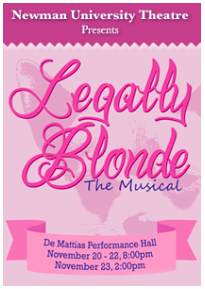 To say that Newman University’s production of the musical Legally Blonde was performed with its book and lyrics intact this past Saturday and Sunday would seem to be a wholly unremarkable event. But because that wasn’t the case at Thursday and Friday’s shows, the fidelity of the latter two performances is rather more intriguing. How did a university production suddenly shift away from censorship halfway through a four performance run? How, to paraphrase a lyric from The Producers, did Legally Blonde go right?
To say that Newman University’s production of the musical Legally Blonde was performed with its book and lyrics intact this past Saturday and Sunday would seem to be a wholly unremarkable event. But because that wasn’t the case at Thursday and Friday’s shows, the fidelity of the latter two performances is rather more intriguing. How did a university production suddenly shift away from censorship halfway through a four performance run? How, to paraphrase a lyric from The Producers, did Legally Blonde go right?
* * *
Newman University in Wichita, Kansas is a Catholic school with an undergraduate enrollment of 2,795, according to data from the U.S. News and World Report online rankings. It was founded by a religious order, the Adorers of the Blood of Christ as a women’s college in 1933, becoming co-ed in 1965.
The theater program at Newman is in just its fourth year. It was only in 2013 that students could declare as theatre majors, and the program currently has 18 majors and 12 minors. The school boasts two theatres and the theatre program produces four shows each year. Past productions include Lend Me A Tenor, Iphigenia in Aulis and in Taurus, Measure For Measure, and this fall’s Buried Child. Director of Theatre Mark Manette notes that there have been some rumblings about the content of some of the department’s productions in the past, including sexual content in Tenor and Pippin, citing one 2012 letter to the school newspaper saying that the school was producing plays with “a heaping helping of sexual innuendo.”
In announcing Legally Blonde, Manette felt he was choosing a mainstream, modern show for his students, aware that it is one of the most popular musicals in high school theatre. Save for making some very minor script emendations – “god damn” is a problem at a faith-based university, for example – the show went into rehearsals using the script as written. In the words of senior C.L. Smet, a theatre major who was cast as Paulette, “There were very light hints of censorship early on, but only the type of things that we are used to. In most shows we are asked to take out all instances of using the lord’s name in vain because we go to a Catholic university.”
* * *
Manette’s purview over the theatre department does not require him to submit his play selection for approval to the university. But with rehearsals underway, he was called to the Provost’s office on November 6, in order to address rumors that had begun to swirl about the content of Legally Blonde.
“When I was called into the office I was told that our production featured live masturbation, drug use, and two guys kissing,” said Manette. “My response was that the show features none of these things. But the seed of the rumors could be traced to the two changed lines: ‘Masturbatory emissions’ and ‘Get you high and laid’.”
Although Manette clarified the show’s content, he was still asked to make changes to the script. “I was told that I had to make the changes or else,” said Manette. “I did send a letter to the Provost stating that I had signed a contract not to make any changes to the script. He took that up the ladder, so to speak, and told me to go forward with making changes.”

C.L. Smet and Trevor Farney in Legally Blonde at Newman University (Photo courtesy of Newman University)
According to Smet, “Nothing seemed weird until a few days before tech week started, when individual cast members started being pulled aside and told that we had to change lines. For instance, my line ‘What’s she got that you don’t got, three tits?’ had to be changed to ‘three boobs’ this was a very minor change compared to many others but was still frustrating and unnecessary right before tech week. We were told by our director, music director, and the head of our department that these changes were from the administration directly. We were told that several higher-ups…were lodging complaints about the content.”
“We were also told repeatedly not to raise hell about the issue, because if we were to dig too deep we might cause more harm than good,” Smet related. “Obviously, however, we decided to pursue the matter. I was one of the loudest about my disappointment with the administration. I attempted to have a meeting with the President of our college. However, when I told them it was regarding Legally Blonde censorship, I was told she ‘didn’t speak to students,’ which I find very hard to believe. Many other students were confused and bothered by the censorship. A few of them were willing to just lay low and let it pass, but most of my fellow theatre majors saw the utter illegality of the changes and wanted to do something to help. Apart from the legal issues, many students were just sad that at the college level we were expected to perform a watered-down play, as if the world would end if somebody say “masturbate” on stage. It was a very frustrating and confusing time for everybody involved.”
* * *
 On the evening of the first performance, the school newspaper, The Vantage, published its weekly print edition with a lead story on the censorship of the Legally Blonde text. The story was assigned by the paper’s editor-in-chief, senior Matt Riedl – who happened to be a member of the Legally Blonde ensemble.
On the evening of the first performance, the school newspaper, The Vantage, published its weekly print edition with a lead story on the censorship of the Legally Blonde text. The story was assigned by the paper’s editor-in-chief, senior Matt Riedl – who happened to be a member of the Legally Blonde ensemble.
“It was my decision as editor-in-chief to pursue the story,” said Riedl. “It wasn’t something that was being brought out by the administration. We thought it was our responsibility. Every viewpoint can be voiced. There had been a few voices that had been pro-censorship, but we thought it was important that every viewpoint be represented.”
The story by Delaney Hiegert, ran with the headline “Legally Blonde Censorship Rankles Cast Members,” as well as a subheadline, “Illegally Changed?” It cited Provost Michael Austin confirming that the show would be a censored version.
There were at least six lyric changes to the musical, as well as multiple dialogue changes, in order to make the play more appropriate for all audiences, he said. The changes involved taking out any sexually derogatory remarks, references to sex and drugs, any use of the word “Christ,” and most all cursing.
For instance, Elle Woods’ line “masturbatory emissions” has been changed to “accidental emissions,” and Professor Callahan’s line, “Get you high and laid,” has been changed to “Get you entertained.”
“When we do plays, we are inviting not just the campus, but the community to come watch,” said Austin. “We have to be very careful to represent the values of the institution.”
The Vantage article spoke not only to the changes to Blonde, but the greater potential impact of the censorship on the theatre program. Quoting freshman Trevor Farney:
“I loved being a part of Buried Child. I love the directors and the people I’ve gotten to work with,” Farney said. “But I don’t want to act in something that’s just going to be a watered-down version of what it should be. In Legally Blonde, the censorship is annoying but it doesn’t hurt the production that much. But if the censorship continues, I don’t even know if I’d want to stay in the program. And that’s a shame.”
The Vantage story made the alteration of the Blonde script a campus-wide issue. Riedl cited that the piece received 1500 page views on the paper’s website, in contrast to the prior month’s top story, which had only 700. He noticed that in some places, in particular the theatre’s lobby, someone had flipped the papers upside down in their racks, so that the headline wouldn’t show. He said that his girlfriend reported sitting in the theatre pre-show and watched as many people read the paper’s front page.
“The article in the Vantage was huge,” said Smet. “It had a massive impact around campus and the entire Wichita theatre community. The outpouring of support was awesome, and it encouraged the cast to continue fighting.”
* * *

Legally Blonde at Newman University (Photo courtesy of Newman University)
The first two performances of Legally Blonde at Newman contained the mandated cuts and substitutions imposed by the administration. But C.L. Smet says that change was already afoot.
“Once the Vantage article was published, cast members became even more open about not being okay with the censorship,” Smet said. “For our Saturday performance we returned 100% to the written word of the script – we did the play that was actually written. We joked that it was the first Legally Blonde performance we’d done, and after the show we all had a group bonding moment celebrating the uncensored show.”
Riedl described the decision in similar terms. “We decided to perform the musical in its full uncensored form on Saturday and Sunday,” he said. “It was kind of a group decision. We had a little meeting before our performance on Friday and we talked about it. The coverage was getting so widespread and everyone was talking about it so we decided we weren’t going to put up with it any longer. We were going to subvert the order to change.”
The student motivated changes don’t precisely jibe with the account from Provost Michael Austin.
“We ended up not making the changes,” said Dr. Austin. “They went on according to script. We looked at what might be possible but decided that we’d do it the way it was in the script.”
Austin did say that the issue was a major one for the school, saying it was “hotly debated and discussed.” He said that he attended the show on Sunday and that the show was performed as written, but could not speak to whether the complete text was in use at all performances.
Riedl professed surprise when informed that the administration had withdrawn its requests for text changes. “Really? That’s interesting,” he said. “Because I was under the impression it was a cast decision. There’s definitely some confusion there. I had not heard that. That’s very interesting.”
Riedl went on to recount a moment during the Saturday night show, during the song, “Blood in the Water.” “‘Get you high and get you laid’ was supposed to ‘get you entertained,’ he recounted. “From the stage, I heard someone whisper, ‘I thought that was supposed to be censored.’ It took some power to not break character from that.”
With somewhat conflicting stories about how the show was restored to its original text, Manette seemed to walk a careful line about what had taken place. He ascribed the choice to the students, noting that, “The people who had called for the censorship were not the ones behind the decision to do the show as written.”
* * *
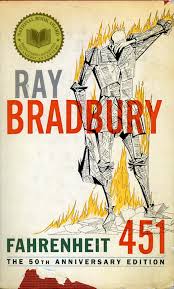 The issue of censorship is not an off-limits topic on the Newman University campus. It’s worth noting that all freshman this year were assigned to read Ray Bradbury’s Fahrenheit 451, the now classic novel in which censorship is taken to its ultimate extreme, with all books being sought out and burned by “fireman,” forcing lovers of knowledge into clandestine circles designed to preserve knowledge and texts.
The issue of censorship is not an off-limits topic on the Newman University campus. It’s worth noting that all freshman this year were assigned to read Ray Bradbury’s Fahrenheit 451, the now classic novel in which censorship is taken to its ultimate extreme, with all books being sought out and burned by “fireman,” forcing lovers of knowledge into clandestine circles designed to preserve knowledge and texts.
“There is artwork all over the building regarding censorship related to that novel,” Manette said. “Most members of the faculty and audience were appalled at the idea of censoring a production. Two pieces of art work across from the entrance of the theatre were mysteriously taken down on opening night – one was a nude – and they were miraculously replaced after the show closed. Coincidental?”
Smet told a similar story. “There was a great deal of other censorship happening in our arts department — nude paintings and “controversial” art work were removed from the hallways against the art department’s will. The entire fine arts sector of Newman was upset that they were being censored. Many people told us they supported us ‘fighting the power’.”
* * *
It’s unclear precisely where the complaints about Legally Blonde began and it’s also not certain exactly when or if approval was given to perform the show as written, as it was at the latter two performances. Precisely who in the administration really wanted the show edited remains somewhat vague, and no one with direct knowledge would speak to it on the record. But certainly the students took matters into their own hands, perhaps with the tacit approval of some members of the school administration.
Dr. Austin was quite clear about lessons learned from the imbroglio.
“Generally, I can say that the incident was not handled well,” he wrote to me, “for which I take full responsibility. We will not be suggesting changes to plays in the future, nor do we have any plans to exercise prior restraint on plays chosen by the Theatre Department.”
Austin’s statement is very encouraging, suggesting that Mark Manette will be able to continue to build Newman University’s theatre department and give his students the opportunity to work on a wide range of shows – as they were written. For the staff of The Vantage, they’ve gotten proof of the power of independent journalism to foster change. As for the cast of Legally Blonde? They’ve demonstrated that the words spoken on a stage matter, and that the words of authors come first.
* * *
Note: interviews for this article were conducted through a combination of voice interviews and e-mail correspondence. The word “said” may apply to both voice and e-mail communications.
November 24th, 2014 § § permalink

Benedict Cumberbatch in The Imitation Game
As prestige movies open pell-mell in the next few weeks, and Oscar campaigns already underway blaze into full public awareness, one of the contenders will surely be The Imitation Game, starring Benedict Cumberbatch and Keira Knightley. It tells the story of Alan Turing, the British mathematician who is widely credited with breaking the Nazi’s “Enigma” code and whose name is regularly invoked in discussions of artificial intelligence, specifically over how or whether we might one day create a machine whose thoughts are indistinguishable from those of a human.

Alan Turing
As with any major film, especially one with Oscar hopes, there will be a near-avalanche of stories about the film: its director, its stars, its writer – and the man who inspired it. I don’t want to give much away for those unfamiliar with the tale, but Turing’s life truly encompassed World War II intrigue, intellectual triumph, reprehensible bias, persecution and injustice, and great tragedy. There’s going to be a cottage industry of stories on Turing – paeans, revisionist history, alternative views, and so on, right up through Oscar night.
For many, this may be their first encounter with the Turing story and they’ll be drawn in by the considerable glamour and talent of Cumberbatch and Knightley (I haven’t seen it yet, so I’m going solely on the advance word and promotion). There’s a cautionary part of the story that’s well worth being told many times over.
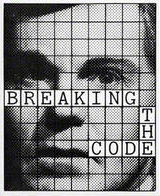
Broadway logo for Derek Jacobi in Breaking The Code
But for theatregoers with moderately long memories (I count myself among them), The Imitation Game will come as something less than a revelation historically, because the West End and Broadway beat the movies to the punch almost 30 years ago, with Derek Jacobi as Turing in Hugh Whitemore’s play Breaking The Code. Like The Imitation Game, it was based on Andrew Hodges’s book Alan Turing: The Enigma.
Breaking The Code played for six months in New York 1987-88, following on the heels of Jacobi’s triumphant performances in the Royal Shakespeare Company’s repertory of Cyrano de Bergerac and Much Ado About Nothing (both opposite Sinead Cusack); I was fortunate enough to have seen all three, and it cemented my deep admiration for Jacobi as one of the finest actors of his generation. As for the play, while I long believed that it was Jacobi who truly made the experience remarkable, and unrepeatable, I saw the show years later at the Berkshire Theatre Festival with Jamey Sheridan in the Turing role, and to my surprise I was once again fascinated and deeply moved.
Now of course vastly more people see most movies than see a play, but as Imitation Game launches, I was thrilled to discover that Jacobi’s performance has been preserved, in a 1996 BBC adaptation of the play by Hugh Whitemore, available online in its entirety.
https://www.youtube.com/watch?v=S23yie-779k
While it is an adaptation, not simply a film of the play, the TV version will give us a chance to see two portrayals of one man by two superb actors, refracted through the views of different writers and directors – and societal growth and change regarding LGBTQ life and rights – at an interval of 30 years.
November 20th, 2014 § § permalink
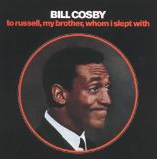 A couple of years ago, in conversation with a childhood friend on Facebook, we began recalling the hours spent in my basement listening to the early comedy records of Bill Cosby. Suddenly, a business associate from my adult life joined in, demanding to know how we could reminisce about this, given the many allegations made against Cosby, and the one out-of-court settlement, regarding his sexual assaults on women. Because the dialogue was focused on fond memories, not Cosby himself per se, and because this associate wouldn’t let it go, I unfriended him. I did so despite the fact that I knew of the charges, believed them, and had already ceased to enjoy Cosby’s new work. At that moment, however, I just wanted reverie.
A couple of years ago, in conversation with a childhood friend on Facebook, we began recalling the hours spent in my basement listening to the early comedy records of Bill Cosby. Suddenly, a business associate from my adult life joined in, demanding to know how we could reminisce about this, given the many allegations made against Cosby, and the one out-of-court settlement, regarding his sexual assaults on women. Because the dialogue was focused on fond memories, not Cosby himself per se, and because this associate wouldn’t let it go, I unfriended him. I did so despite the fact that I knew of the charges, believed them, and had already ceased to enjoy Cosby’s new work. At that moment, however, I just wanted reverie.
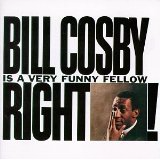 I did not then, nor do I now, countenance any of the actions with which Cosby is charged. I abhor them. I feel deeply sympathetic towards, and supportive of, any woman who may have been harassed, drugged or assaulted by him. I wish that he could stand trial for what he’s been accused of, so that he could be tried in the judicial system and not solely in the media. This is a case in which justice will likely never be done, in which there will always be unanswered questions – especially from Cosby himself, whose silence, as they say, speaks volumes.
I did not then, nor do I now, countenance any of the actions with which Cosby is charged. I abhor them. I feel deeply sympathetic towards, and supportive of, any woman who may have been harassed, drugged or assaulted by him. I wish that he could stand trial for what he’s been accused of, so that he could be tried in the judicial system and not solely in the media. This is a case in which justice will likely never be done, in which there will always be unanswered questions – especially from Cosby himself, whose silence, as they say, speaks volumes.
 But I can’t deny how much Cosby’s comedy meant to me in my youth. Long-unseen friends recall it readily at a distance of 40 years. The only time my brother and I came together peacefully as kids was to listen to comedy recordings, which we committed to memory. Later, when I lived with my parents for a year post-college, my family gathered in the room in our house where my godmother spent the final year of her life, promptly at 8 pm on Thursday, to watch The Cosby Show.
But I can’t deny how much Cosby’s comedy meant to me in my youth. Long-unseen friends recall it readily at a distance of 40 years. The only time my brother and I came together peacefully as kids was to listen to comedy recordings, which we committed to memory. Later, when I lived with my parents for a year post-college, my family gathered in the room in our house where my godmother spent the final year of her life, promptly at 8 pm on Thursday, to watch The Cosby Show.
So what do I do with treasured recollections in which an alleged predator played a central role? How can I even remember the work with warmth – work which in and of itself seems timeless in much of the material – even as I disavow its creator?
 Audiences in England faced these same questions when the pedophilia scandal at the BBC arose, first over the late Jimmy Savile and a bit later over Rolf Harris. I followed those stories in horror and disbelief, though it was Harris whose work I actually knew: his novelty hit “Tie Me Kangaroo Down Sport” was a staple on the Dr. Demento radio show, another touchstone for me. In the case of Harris, who also became known as an artist, communities began removing his paintings and eradicating his murals. This is akin to what TV Land has just done by removing The Cosby Show from their line-up, to dissociate themselves from the now irrevocably tarnished brand and likely because no advertiser would accept the association. But in each case, those who were entertained, unknowing, must reconsider their relationship, to the men, and to the work. Let’s not forget that Stephen Collins, who portrayed the father on the popular family drama 7th Heaven, is under scrutiny for what appears to be self-admitted incidents of child abuse, surfaced during his contentious divorce proceedings.
Audiences in England faced these same questions when the pedophilia scandal at the BBC arose, first over the late Jimmy Savile and a bit later over Rolf Harris. I followed those stories in horror and disbelief, though it was Harris whose work I actually knew: his novelty hit “Tie Me Kangaroo Down Sport” was a staple on the Dr. Demento radio show, another touchstone for me. In the case of Harris, who also became known as an artist, communities began removing his paintings and eradicating his murals. This is akin to what TV Land has just done by removing The Cosby Show from their line-up, to dissociate themselves from the now irrevocably tarnished brand and likely because no advertiser would accept the association. But in each case, those who were entertained, unknowing, must reconsider their relationship, to the men, and to the work. Let’s not forget that Stephen Collins, who portrayed the father on the popular family drama 7th Heaven, is under scrutiny for what appears to be self-admitted incidents of child abuse, surfaced during his contentious divorce proceedings.
 In the cases of Savile, Harris, Collins and Cosby, the issue is criminal actions against others. Unconscionable. As an aside, it’s worth recalling that Paul Reubens was immediately shunned two decades ago following his arrest for masturbating in a porn theatre – a crime, at odds with his role as a Saturday morning children’s performer, but in that case a victimless one. Though he managed to secure acting roles intermittently, it’s only in the past few years that his Pee Wee Herman persona has been publicly embraced once again. I wonder whether his resurrection would have been possible had his transgression occurred in the era of social media – or whether he might have been rescued by it. Certainly it is social media which has allowed the long-standing allegations against Cosby to engage the public consciousness at last.
In the cases of Savile, Harris, Collins and Cosby, the issue is criminal actions against others. Unconscionable. As an aside, it’s worth recalling that Paul Reubens was immediately shunned two decades ago following his arrest for masturbating in a porn theatre – a crime, at odds with his role as a Saturday morning children’s performer, but in that case a victimless one. Though he managed to secure acting roles intermittently, it’s only in the past few years that his Pee Wee Herman persona has been publicly embraced once again. I wonder whether his resurrection would have been possible had his transgression occurred in the era of social media – or whether he might have been rescued by it. Certainly it is social media which has allowed the long-standing allegations against Cosby to engage the public consciousness at last.
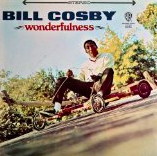 I could go underground with my appreciation of Cosby’s work, but that feels hypocritical. I cannot rewrite my past, even as it is – and should be – impossible to reconcile it with what has reemerged in the past few weeks, with greater traction than ever before. Given the enormous influence of The Cosby Show, I’m certainly far from the only person in this confused state; I suspect my affinity for the comedy recordings may be somewhat more rarified, especially among those younger than I am. No doubt I Spy and Fat Albert fans are experiencing profound dissonance as well. In fact, I hope they are.
I could go underground with my appreciation of Cosby’s work, but that feels hypocritical. I cannot rewrite my past, even as it is – and should be – impossible to reconcile it with what has reemerged in the past few weeks, with greater traction than ever before. Given the enormous influence of The Cosby Show, I’m certainly far from the only person in this confused state; I suspect my affinity for the comedy recordings may be somewhat more rarified, especially among those younger than I am. No doubt I Spy and Fat Albert fans are experiencing profound dissonance as well. In fact, I hope they are.
I normally write because I have something very specific I want to say. In this case, I write because I’m grappling with deeply conflicted feelings. What do we all do when our childhood heroes are alleged, or revealed, to be profoundly different from the work and personae for which they became famous? How do we stand with victims, and against all such crimes, yet harbor genuinely warm memories created by the same artist? I can rethink my feelings about Cosby the man, and I have, but I don’t know that I can rethink my childhood, and the role he played in it. Should I? Can you? And if we truly can’t, where does that leave us? Are we hypocrites, or dupes, or forever divided as truth intrudes, maybe forcing us to even rewrite our own memories.
Addendum, 5 pm, November 20: As I discuss this post on Twitter, Facebook and e-mail, another corollary presents itself, though its not as clearcut. Phil Spector was convicted of murder, yet no one seems to shun the classic records he made as a producer. Is it because he’s not the named artist, and so the line is less clear? But let’s remember, whatever Cosby has done, his alleged crimes aren’t Phylicia Rashad’s, or Lisa Bonet’s, or Robert Culp’s, and so on. Must their work be excised and shunned because of their co-star’s actions? For that matter, have people stopped watching the Police Squad movies because of O.J. Simpson? It may be difficult not to view them through the prism of true-life revelations, but there seem to be no correct or consistent actions or reactions.
November 8th, 2014 § § permalink
When the news hit on Thursday, it flew around the New York theatre community as quickly as the unexpected closing of a Broadway show.
The Cafe Edison on 47th Street is a fixture, one that opened in 1980, but seems as if it has been there much, much longer. From the moment people heard it was being evicted to make way for an upscale restaurant, mourning began (even though it will be around for another month or so), with theatre district denizens eulogizing it as one of the last vestiges of the “old” Times Square, more of a piece with Colony Records and Howard Johnson’s than American Eagle and the Build-a-Bear Workshop.
Others have written eloquent commemorations of a place not yet quite gone (Julie Klausner’s is startlingly similar to my own thoughts on both the restaurant and the announcement), so I won’t attempt to top any of them (I am on record in the New York Daily News). However, as some stalwarts organized before today’s matinee to rally against the decision by the owners of the space, which is part of the Edison Hotel, I felt the least I could do was to commemorate their demonstration of support.
If you’d like to sign a petition in support of the Cafe Edison, in hope of persuading the craven property owners to reverse their edict, click here for the official effort.
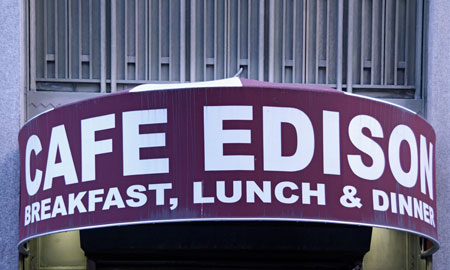
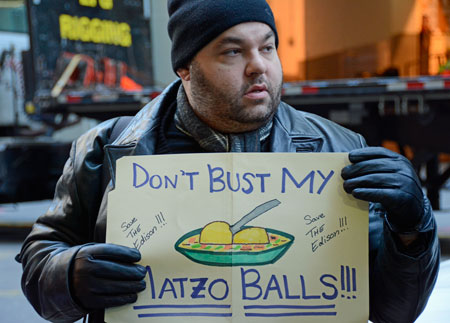

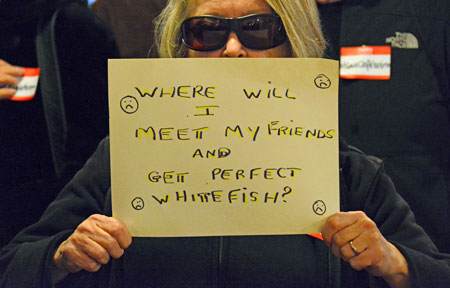
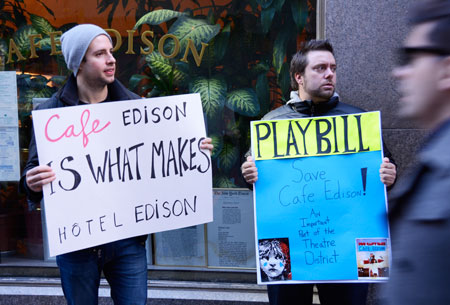
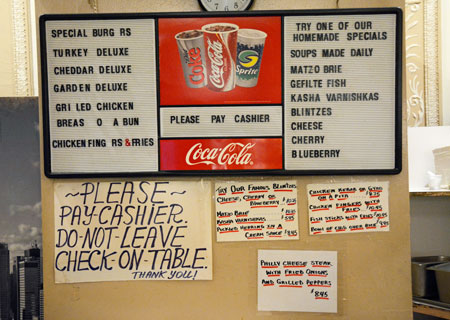
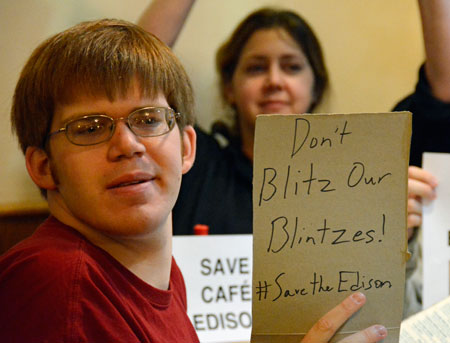

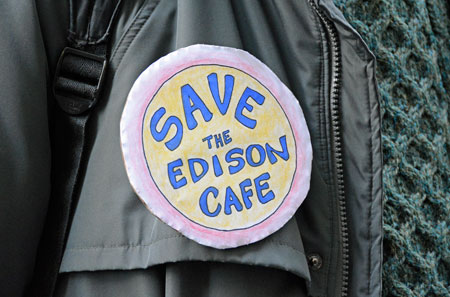

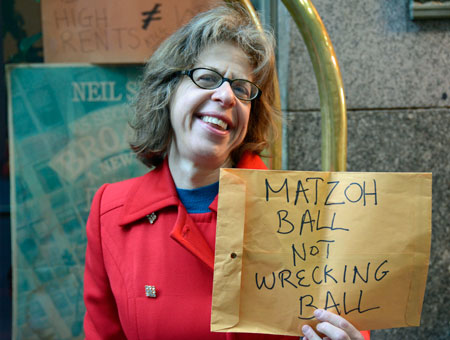
November 3rd, 2014 § § permalink
In the song “The Book Report” from the musical You’re A Good Man, Charlie Brown, Lucy van Pelt struggles to complete her homework assignment: 100 words on Peter Rabbit. Falling short, she concludes it thusly: “And they were very very very very very very happy to be home. The very very very end.”
 In honor of this blatant effort to reach a designated threshold without utilizing meaningful content, I would like to present the very very very first “Lucy Van Pelt Award for Verbal and Political Padding” to Senator Tom Coburn (R, Oklahoma), for the 2014 edition of his much-publicized “Wastebook.” For those who haven’t heard of it, the Wastebook is Coburn’s perennial compilation of excessive and/or unnecessary federal spending. It tends to generate a good bit of attention for its most absurd items in all manner of media. A careful parsing of Coburn’s annual lists may reveal a partisan bent and a truckful of snark, though in reviewing the past few years of reports, I did note that he wasn’t above calling attention to what he deemed wasteful spending in his home state too.
In honor of this blatant effort to reach a designated threshold without utilizing meaningful content, I would like to present the very very very first “Lucy Van Pelt Award for Verbal and Political Padding” to Senator Tom Coburn (R, Oklahoma), for the 2014 edition of his much-publicized “Wastebook.” For those who haven’t heard of it, the Wastebook is Coburn’s perennial compilation of excessive and/or unnecessary federal spending. It tends to generate a good bit of attention for its most absurd items in all manner of media. A careful parsing of Coburn’s annual lists may reveal a partisan bent and a truckful of snark, though in reviewing the past few years of reports, I did note that he wasn’t above calling attention to what he deemed wasteful spending in his home state too.
The new report, on its comic book meets tabloid cover, trumpets $25 billion in government waste in only 100 examples. Without being deeply grounded in every item he cites, I must admit that a few do make one wonder. However, I have to chide Coburn for a few of his 2014 examples, specifically those derived from National Endowment for the Arts grants. Alongside “Swedish Massages for Rascally Rabbits” and “Watching Grass Grow,” Coburn calls out:
- “Teen Zombie Sings, Tries To Get A Date To The Dance” ($10,000 for the musical Zombie in Love at Oregon Children’s Theatre)
- “Colorado Orchestra Targets Youth With Stoner Symphony” ($15,000 for a Colorado Symphony concert thematically linked to the state’s newly legal industry, but performing standard symphonic works)
- “Roosevelt and Elvis Make A Hallucinatory Pilgrimage To Graceland” ($10,000 to The TEAM for their play RoosevElvis, to be seen this winter at the COIL Festival)
- “Bruce Lee Play Panned As Promoting Racial Stereotypes” ($70,000 to Signature Theatre Company for the production of David Henry Hwang’s Kung Fu)

Libby King and Kristen Sieh in The TEAM’s RoosevElvis (Photo by Sue Kessler)
While Coburn surely hasn’t seen or read any of these productions, his efforts to make these minimal grants into shameful instances of government funds gone awry relies only on inevitably reductive synopses and selectively quotes from the odd negative review as if to justify his point about these NEA funded projects. The headlines are of course chosen to make the work itself sound as absurd as possible. Worth noting: Coburn seems to have a particular distaste for children’s theatre, having also called out $10,000 for the production of the musical Mooseltoe at the Centralia Cultural Society in Illinois in the 2013 Wastebook. There are other arts related items in the 2014 report, but they’re actually funded outside of the NEA, the largest being $90 million for the State Department’s Cultural Exchange programs, targeted by Coburn for a handful of unconventional performers he selected from a much larger pool, a rigged argument at best.
Coburn’s increased role as an arts critic is no doubt due to the mileage he got out of his 2013 list’s inclusion of a $697,000 grant to the theatre company The Civilians for their musical The Great Immensity, about climate change. Obviously the subject matter was a hot-button for the Senator, and I imagine that numerous arts groups must be envious of the sum (far in excess of what groups typically get from the NEA), but Coburn fails to take into account the respect accorded to the work of The Civilians in artistic circles – and arts groups should take note that the largesse came not from the NEA, but from the National Science Foundation, due to the specific subject. It may be a bigger and easier target for Coburn, but it’s not a worthy one.
Whatever the politics and bias behind it, I’m willing to grant that there’s some value in Coburn’s list, such as highlighting the famous Alaskan Bridge to Nowhere or calling out excessive spending on the incompetent overhaul of government computer systems. But his four NEA-based examples this year are simply padding, as they represent only 0.00042% of his report’s dollar total, but 4% of his report. It’s just another example of a politician attacking the arts as an easy target, when there are bigger and more essential fish to fry.

Cole Horibe in Kung Fu at Signature Theatre (Photo: Joan Marcus)
Regarding the four “wasteful” grants in question, I can offer a personal opinion on only one, namely Kung Fu, which was ambitious and perhaps not completely realized in its debut at Signature. But it was – and is – a worthy project by an artist whose work is always deserving of support. By the way, David Hwang has told me there’s more work to be done on the piece and he’s recently made public note of plans to remount it soon to implement further changes. When that happens, I’ll do my best to invite Senator Coburn to Kung Fu as my guest though he may be out of the public eye and not up to it – he’s leaving Congress at the end of the year for health reasons, and this year’s list may be his parting shot.
Of course, health permitting, Coburn could keep producing the Wastebook after leaving office, if he has a real commitment to exposing government waste. But I’m willing to bet that he won’t. Why do I say that? Because surely most people realize that his annual screed is produced by his staff, maybe even eager young interns, not by Coburn’s own personal research and writing efforts. Come to think of it, I wonder how much the Wastebook cost the U.S. taxpayer each year, in staff research and writing time? I suspect it’s more than the federal government gave to Mooseltoe.
P.S. Let’s all go see The TEAM’s RoosevElvis when it plays New York’s P.S. 122 in January 2015 and each decide for ourselves whether the $10,000 from the NEA was well spent. I, for one, wasn’t aware of the show, but I’m now looking forward to it. Gee, thanks Senator Coburn!
October 21st, 2014 § § permalink
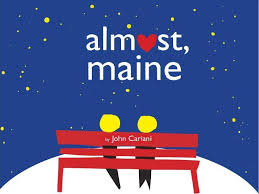 Earlier this month, the administration at Maiden High School in Maiden, North Carolina tried to put a stop to the student production of John Cariani’s Almost, Maine. With permission slips in hand, the cast chosen and rehearsals just underway, the school announced the show was off. But it’s only off school grounds. The play will go on.
Earlier this month, the administration at Maiden High School in Maiden, North Carolina tried to put a stop to the student production of John Cariani’s Almost, Maine. With permission slips in hand, the cast chosen and rehearsals just underway, the school announced the show was off. But it’s only off school grounds. The play will go on.
* * *
As first reported last week by WSOC TV in two reports [here and here], with additional reporting from Think Progress, Almost, Maine was shuttered because of a single scene, entitled “They Fell,” in which two buddies reach the startling discovery that they love one another – by actually falling down. Repeatedly. There’s no sexual innuendo, no physical contact, and the words “gay” and “homosexual” aren’t spoken. The scene takes up six pages of a 54 page text.
It’s not as if the school didn’t know the play was in the works. Maiden High School junior Conner Baker, who was to direct the production, said that when the administration was asked for permission, they gave it within a day.
“Our teacher advisor spoke to our principal,” said Baker, “who then spoke to the superintendent. We were told through our student advisor.”
She explained that students had to get permission slips with parents expressly agreeing to let their children participate, which hadn’t happened before in her experience. Of the permission slip, she said, “I don’t remember it word for word. It was along the lines of, ‘We have chosen Almost, Maine as our fall play this year. The play includes nine vignettes about love, one of which is centered around two male best friends who realize they are in love with each other’.”
Baker also described parents being required to come to one of two meetings in person to give their approval, also a new requirement. “Whenever a parent came in, I explained to them the content of the play and told them that for their child to audition, they needed to sign the permission slip.” Students also were permitted to audition with the scene in question, but Baker said she didn’t know where that requirement came from. “We were told by our teacher, though I know it wasn’t her decision. I also do not know why.”
After the show was cast and had just begun rehearsals, the word came that the show was off. “We were told by our teacher. They said the community isn’t ready for it. There wasn’t really a big discussion about it.”
* * *

Maiden High School’s logo
In spite of all the strictures placed on the audition process – the permission slips, parents coming to meetings – the school’s statement, issued after the news media began to pick up the story, clearly sought to obfuscate the issue, using the ‘approval hadn’t been given’ excuse that crops up so regularly in instances of school theatre censorship. Issued by Principal Rob Bliss (Robert_Bliss@catawbaschools.net) , it read:
“Our faculty and staff are still in review of potential performances to be conducted by our students this fall. At this time, no final decision has been made regarding whether and what drama performances are to be presented this fall. In regards to the request for students to perform the play “Almost Maine,” careful review and consideration was given to the contents of this play. The play contained sexually-explicit overtones and multiple sexual innuendos that are not aligned with our mission and educational objectives.
“As principal of Maiden High School, I have an obligation to ensure that all material, including drama performances is appropriate and educationally sound for students of all ages.”
The consensus in conversations on Facebook between various students was that some adults and churches in the area had made their displeasure known to the school administration, focusing on the gay storyline. None of them appear to have made their concerns known publicly. Yet this prompted the school to pull the plug without giving any hearing to those in support of the play.
* * *
Upon learning about the cancelation, one area adult, Carmen Eckard, a former local teacher, sent an e-mail to a number of administrators at the school. She wrote, in part:
“These kids have spent years fostering their love of theatre. In fact, I taught many of them at Startown Elementary, and they loved theatre class! That has blossomed into a real appreciation and dedication, and the decision to cancel a play after rehearsals had begun is extraordinarily disrespectful, and counterintuitive to education.
“Their passion is now spurred, and they will show you how dedicated they are. I’m sure you’ll quickly realize that a mistake has been made.
“My advice would be to reinstate the play, before Huffington Post picks up this story. It’s just the kind of thing they love, and I’m sure we’ll all appreciate not being highlighted in national news as a ‘backwards’ town, again.”
She received a response from the school superintendent Dr. Dan Brigman (dan_brigman@catawbaschools.net), who thanked her for writing, but didn’t address Almost, Maine at all, simply saying another appropriate play would be found. [For legal reasons, I am paraphrasing the superintendent’s brief reply.]
It seems a shame that Brigman didn’t heed Eckard’s warning, given the media attention that has resulted from the cancelation (even reaching up into Maine). As for being highlighted in the national news “again,” while I didn’t ask Eckard what she was referring to specifically, I am assuming it was the 2012 stories about local Pastor Charles Worley of the Providence Road Baptist Church in Maiden. Worley got lots of press, far beyond HuffPo, for stating that gays and lesbians should be confined behind an electrified fence. Plenty of North Carolinians spoke out against Worley at the time, but his church remains active in the community.
* * *

Conner Baker (l.) and Carmen Eckard (photo by Eckard Photographic)
Eckard did more than just write a letter. She got involved.
“As soon as I realized that it was my old students and the play was Almost, Maine, I started looking for ways to help,” she wrote in an e-mail. “By Friday, Connor and I had scheduled a meeting, and people had started contacting both of us, asking for ways to help.”
In my very first communications with Baker and Eckard, both immediately said they hoped to try to do the play off-campus, so I asked them both whether they considered fighting the decision.
Referring to the response she received from the principal, Eckard continued, “The response I received convinced me pretty thoroughly that trying to change the ruling would be a waste of time. It also gives the power in the situation completely to the school board – it’s their decision. The community is extraordinarily conservative.”
Conner Baker said, “I think at first we considered that, but as a group, we just want to do what’s best for us. Our whole reasoning behind speaking out was to be able to do the show.”
While many outside groups and individuals offered their support, Baker and Eckard felt it was best not to be antagonistic as they went forward.
Eckard explained, “The kids said, ‘The main thing we want to do is that we don’t want to alienate the community, we want to keep things positive. We’re going to take our play somewhere else for people who want to see it.’ I think this way will make people happy-ish.”
* * *
Before learning that the show might go on off-campus, playwright John Cariani learned of the situation in Maiden and crafted a reply that was posted to the Almost, Maine Facebook page. It read, in part:
“If Maiden High School administrators take issue with ‘They Fell’ because it’s about two young men who are simply stating their feelings for one another, they are calling into question the validity of same-sex love by making it seem wrong and different and other. They are allowing a dangerous cycle of fear and self-hatred among LGBTQ youth to continue, and, consequently, they are tacitly promoting homophobia. This is simply not necessary. Nor is it helpful. We don’t need any more Tyler Clementis or Jamey Rodemeyers and Jamey Hubleys. We need kids to know that it’ll “get better.” Falling in love is tough enough when you’re young. Let’s remove the stigma of falling in love with someone of the same sex…
“By canceling the play, it seems to me that school officials are pleasing parents and pillars of the community rather than serving the students. I think there’s a better solution than to stop the production.”
In a phone conversation, I asked Cariani if he had originally conceived of his play being performed by high schools, where it is enormously popular, landing as number one on the Educational Theatre Association’s list of the most produced plays in high school theatre this year. (You can see a list of upcoming productions by searching on the Dramatists Play Service website’s Page to Stage page.)
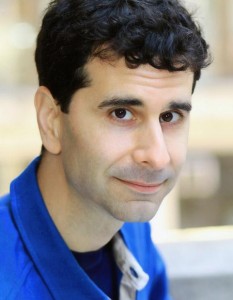
John Cariani, author of Almost, Maine
“Not at all,” he replied. “I thought it was a play for adults. The first high school production was Cape Elizabeth High School in Maine. They were a great theatre program when I was growing up [also in Maine, but in another school system]. Their teacher approached me and I thought, ‘High school students can’t do this play.’ But I got to see their production. The teacher helped me to understand that high school kids are on the verge of adulthood, but still optimistic of what the world can do for them and what they can do for the world. That is what makes high school kids, when they do it well, do it super-well.”
Cariani said he knew of a couple of instances in the past where there were efforts to censor or cancel the play. He noted one at Bel Air High in Maryland where the American Civil Liberties Union was instrumental in insuring the play went on. He also echoed Baker and Eckard’s sentiments about how to go forward.
“It’s important that we achieve our goals without being mean,” he offered. “It’s dangerous.”
But, I wondered, given the countless productions around the country, wasn’t it possible that some school might have already done, or might be planning to do, the show and altering “They Fell” unilaterally? What would he like to say to anyone who has done that or contemplates that, against the legal contract of the license and copyright law?
“It’s lying,” said Cariani, “because that’s not the play.”
* * *

Some of the Maiden High Students who will continue to work on Almost, Maine (Photo by Eckard Photographic)
Last night, October 20, Baker and Eckard held a small meeting to begin organizing the play for production away from Maiden High School, discussing possible venues, budgets and timing.
I asked Baker whether she thought she might lose any of her cast, since the show is no longer a school activity, especially because the school has already begun surveying students as to their interest in participating in an alternate play under official auspices.
“Only one person for sure said they couldn’t do it anymore,” she replied. “But the show really is meant for four actors and we have a cast of 20, so even if half of them dropped out, we could still do it.”
Maiden senior Logan Riley wrote to me, regarding the school’s effort to mount its own show, “The school system wants to have another show to settle the unrest in the community. This does not mean that we will actually put on another show.”
Moving the play off school grounds could still result in opposition. Are either Baker or Eckard concerned?
“We don’t care if they oppose it,” said Eckard. “Free speech! It won’t matter if they are against a public performance, because those of us involved aren’t under any particular employment or jurisdiction that would cause us to fear retribution.”
Baker echoed the sentiment. “I mean, people will complain no matter where we perform it. We aren’t forcing anyone to come out and see it, but if people do protest, it won’t stop us from performing it.
* * *
So the students of Maiden High School are going forward with Almost, Maine, targeting the first weekend in January for production. They’ve set up a Kickstarter page to raise the funds they need and hope to confirm a location shortly. Their cleverly named website-to-be is www.almost maiden.com.
This isn’t the first time students have taken a show off of school grounds to get it done (there are many precedents, including Wilton CT and La Grande OR) and one has to applaud the Maiden students’ commitment to seeing the show happen, with its myriad messages of love intact. I have to confess to feeling that the school is getting off easy, since the relocated production also shifts the spotlight off of their efforts to silence the students and the play, leaving intact the utterly unacceptable official message that LGBTQ love is something to be hidden away – even as North Carolina begins legal same sex marriages.
But Conner Baker has a simple reason for how the play will now happen, and it’s pretty hard to argue against.
“We aren’t doing it to upset anyone,” she says. “We just want to do what we love doing.”
October 16th, 2014 § § permalink
As headlines go, “A challenge for the arts: Stop sanitizing and show the great works as they were created” embodies what many of us were taught in school about the well-made essay: tell people what you’re going to tell them, offer support for your thesis, then tell them what you’ve told them. Unlike many instances where newspaper headlines misrepresent the content of the article that follows, I would say that Philip Kennicott’s article in The Washington Post on October 4th was accurately summarized. As a result, the unsettled feeling I had upon reading it remained with me as I read the piece itself, and long afterwards.
To select two paragraphs which explicitly reinforce Kennicott’s thesis, I offer first:
Censoring art to make it more palatable to contemporary audiences warps our sense of goodness, making our tolerance seem magically delivered rather than hard-won through centuries of struggle. It erases the complex, chaotic history of tolerance, especially problematic at a moment in history when the West is given to lecturing the “rest” on new and culturally alien extensions of compassion and decency across gender, sexual and sectarian lines.
Later in the piece, Kennicott asserts:
To preserve their independence, the arts need to stand resolutely aside from the increasingly complex rituals of giving and taking offense in American society. The demanding and delivering of apologies, the strange habit of being offended on behalf of other people even when you’re not personally offended, the futile but aggressive attempt to quantify offensiveness and demand parity in mudslinging — this is the stuff of degraded political discourse, fit only for politicians, partisans and people who enjoy this kind of sport.
I’m troubled by Kennicott’s charge that the arts in some way fail when they demonstrate sensitivity to prevailing social attitudes. While there are certainly many great works of art that contain misogynistic, racist, and classist attitudes (to name but three), to present them today and excuse them from criticism simply because they are “great” fails to in any way address how society has advanced when addressing inclusion, diversity and equality in the arts. It’s no small matter that the majority of the great works of the Western arts canon were also written by white men, and while that doesn’t negate their value, presenting them as if preserved in amber can be not only profoundly offensive but artistically stultifying.
I don’t happen to take to reworkings of classic works simply in order to fend off complaint; erasing the n-word from Huckleberry Finn struck me as patently absurd when a new edition doing just that appeared a few years ago. By way of example, the same holds true for productions of To Kill A Mockingbird which would eradicate that same word. In both cases, it’s a disservice both to the work and those who consume it. Frankly, I also don’t believe that any work should be, in total, deemed off limits because of changing mores.
But this conversation isn’t as binary as Kennicott presented, a choice between fidelity or censorship. Whether considering a work taught in classrooms or presented professionally on stage, one also has to factor in the interpretation and context, both separately and together.
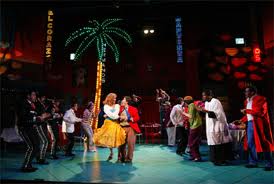
Mark Lamos’s production of The Taming of the Shrew at Yale Rep in 2003 (T. Charles Erickson photo)
There are many Jews who think The Merchant of Venice should never be performed, due to its ant-Semitic elements; I don’t happen to share their opinion. I would however be troubled to find a production that takes to heart the classification of the play as one of Shakespeare’s comedies, playing the shaming of Shylock for boisterous laughs. I know many people who feel the same way about The Taming of the Shrew, but a production by Mark Lamos at Yale Rep some years ago, featuring an all-male Latino cast, took the casual misogyny of the play, once seen as comic, and transmuted it into an exploration of modern male sexual identity, holding the play at a distance to be examined through a modern framing device, rather than asking us to accept the humbling of Kate as a just dénouement. Given the volume of Shakespeare productions every year, I imagine there are numerous interpretations which don’t bowdlerize the language, but instead imbue the plays with new insight; the Donmar Warehouse’s all-female Julius Caesar and Henry IV surely are important examples.

Mhlekazi Andy Mosiea as Tamino in Isango Ensemble’s The Magic Flute (Keith Pattison photo)
As I contemplated this issue, I happened upon online information about a South African production of The Magic Flute by the Isango Ensemble, currently touring the U.S., which has an all-black cast; this presumably immediately alters the perception of the blackamoor Monostatos, who Kennicott used as a key discussion point. At the same time, I was reading a great deal about the Metropolitan Opera’s imminent production of The Death of Klinghoffer, which is at the center of enormous controversy over its depiction of an incident from the real historical past, but on which I can offer no opinion because I haven’t seen it; the controversy only points up the fact that it isn’t solely works from the distant past which can provoke.
Citing counter-examples production by production would be endless, so let me turn to the issue of context. When a class is taught or a company produces a work whose social attitudes reflect less enlightened views, it’s worth noting whether any framing is provided, for students or audience. If a teacher assigned Huckleberry Finn without prior discussion and comprehensive followup, I would question their tact and their skills; to foist the book on students sans preface would, I imagine, be very upsetting to students. The same holds true for reading or seeing The Merchant of Venice without addressing the status of Jews in Shakespeare’s era, in discussion or supporting materials. Exploring how or why we might see these works today, why they may hold value even when they contain retrograde views, seems essential. It won’t necessarily preempt controversy, but it certainly demonstrates that the people presenting the work understand its complexity and challenges, and that they hope to grapple with those challenges by presenting it in a new light.

K. Todd Freeman and Ray Fisher in Fetch Clay, Make Man at New York Theatre Workshop
There are also examples of artists addressing work which would now be seen as offensive by placing it within the context of new works and adaptations. Screenings of films featuring Lincoln Perry, better known by the derogatory name Stepin Fetchit, who at one time was the most famous black actor in the movies, would likely be met by scorn if simply programmed without introduction or discussion of the actor and his character at the time he was working. However, playwright Will Power has worked to address Perry’s legacy by making him a leading character in the play Fetch Clay, Make Man, which places him alongside Cassius Clay (as he became Muhammed Ali) as two icons of African-American popular culture. It’s also unlikely that few theatre companies would produces the once hugely popular melodrama The Octoroon, with its far outdated racial views, but Branden Jacobs-Jenkins has deconstructed the work as part of his play An Octoroon, folding the original material directly into commentary on the same piece.
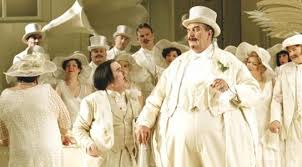
Jonathan Miller’s production of The Mikado for the English National Opera
There are many who defend The Mikado by citing Gilbert and Sullivan’s love of Asian culture and their efforts to represent it, but that often accompanies productions with white actors in yellowface; this ongoing controversy arose once again this summer in Seattle. But 28 years ago director Jonathan Miller found a way to present the work by resetting it in a seaside English resort, allowing the characters in what was widely known to be a spoof of the British aristocracy to be seen as exactly that, instead of antiquated racial caricatures. Again, context and interpretation is all.
I take exception to Kennicott’s characterization of “Cultural leaders who fret about art causing discomfort,” since it evidences a lack of comprehension of the role of those leaders. Yes, we should want all artistic ventures to be brave and bold, and to even take audiences places where they might not necessarily think to go. But they must do so in the context of serving their community, and indeed their many communities, because they do not and cannot exist in a vacuum where art cannot be challenged, often vigorously, in critiques and discussion simply because it has been declared art.
In every generation, art is a dialogue between artists and audiences, whether in performance or fixed texts and images; just as some works aren’t recognized or accepted when first created, there are also those which cease to hold meaning or whose meaning changes as society advances. If an artistic leader chooses to produce a season of vintage works with passé portrayals of women, people of color, people with disabilities, sexual orientation and so on as they might have first been seen, that is absolutely their right. But it is also the right of those who know the work or see it to challenge those decisions – though I abhor the kinds of threats that have emerged over Klinghoffer or Exhibit B at the Barbican, even as I support the rights of the voices which oppose those works to express their opinions. It is very easy in theory to say all works should remain fixed, but reality is another matter altogether.
There are no absolutes in this discussion. If works out of copyright are altered for this production or that, the work itself remains fixed for yet another day, and each example can be judged in relation to the original text. Inevitably, for every leader, whether teacher or producer, it is a matter of balancing a wide range of opinions and perceptions. I personally believe in art for art’s sake alongside art for audiences’ sake, but art for history’s sake serves only the past and runs the risk of propagating the failings of the past. In the arts, history should not be wholly erased, but it should first and foremost be the foundation upon which we build a better future.
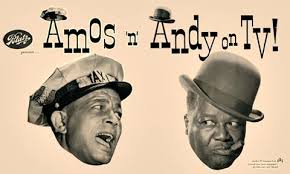 P.S. Among the examples Kennicott cites as falling prey to cultural sanitization is Amos and Andy. While it is true that the show was recognized as an avatar of racial insensitivity when viewed through the enlightened prism of the 1960s civil rights struggle, its absence from the airwaves or cable box is now due just as much to it no longer being commercially viable as to its racial stereotyping. That holds true as well for countless shows from the era, for reasons ranging from a changed society where the work is no longer seen as positive (such as my childhood favorites F Troop and I Dream of Jeannie) to their being in black and white and in the old TV aspect ratio. But Amos and Andy hasn’t been erased: you can view the TV episodes in the collection of the Paley Center for Media or buy the DVDs on Amazon and see for yourself why it’s now for the history books and academic, not mass entertainment.
P.S. Among the examples Kennicott cites as falling prey to cultural sanitization is Amos and Andy. While it is true that the show was recognized as an avatar of racial insensitivity when viewed through the enlightened prism of the 1960s civil rights struggle, its absence from the airwaves or cable box is now due just as much to it no longer being commercially viable as to its racial stereotyping. That holds true as well for countless shows from the era, for reasons ranging from a changed society where the work is no longer seen as positive (such as my childhood favorites F Troop and I Dream of Jeannie) to their being in black and white and in the old TV aspect ratio. But Amos and Andy hasn’t been erased: you can view the TV episodes in the collection of the Paley Center for Media or buy the DVDs on Amazon and see for yourself why it’s now for the history books and academic, not mass entertainment.
October 14th, 2014 § § permalink
Aside from being the month of copious pumpkin flavored foodstuffs, October also brings two perennial theatrical top ten lists that are worthy of note: American Theatre magazine’s list of the most produced plays in Theatre Communications Group theatres for the coming season and Dramatics magazine’s lists of the most produced plays, musicals and one-acts in high school theatre for the prior year. They both say a great deal about the state of theatre in their respective spheres of production, both by what’s listed explicitly, as well as by what doesn’t appear.
In the broadest sense, both lists are startlingly predictable, although for different reasons. If you happen to find a bookie willing to give you odds on predicting the lists, here’s the trick for each: for the American Theatre list, bet heavily on plays which appeared on Broadway, or had acclaimed Off-Broadway runs, in the past year or two. For the Dramatics list, bet heavily on the plays that appeared on the prior year’s list.
But in the interest of learning, let’s unpack each list not quite so reductively.
American Theatre
 As I’ve written in the past, what happens in New York theatre is a superb predictor of what will happen in regional theatre in the coming seasons, especially when it comes to plays. Any play that makes it to Broadway, or gets a great New York Times review, is going to grab the attention of regional producers. Throw in Tony nominations, let alone a Tony win – or the Pulitzer – and those are the plays that will quickly crop up on regional theatre schedules.
As I’ve written in the past, what happens in New York theatre is a superb predictor of what will happen in regional theatre in the coming seasons, especially when it comes to plays. Any play that makes it to Broadway, or gets a great New York Times review, is going to grab the attention of regional producers. Throw in Tony nominations, let alone a Tony win – or the Pulitzer – and those are the plays that will quickly crop up on regional theatre schedules.
Anyone who follows the pattern of production would have easily guessed that Christopher Durang’s Vanya and Sonia and Masha and Spike would proliferate this year, being a thoughtful, literary based comedy with a cast of only six. That American Theatre lists 27 productions doesn’t even take into account the 11 theatres that did the show in 2013-14, and certainly there are non-TCG theatres which are doing the show as well. It’s no surprise that Durang has said he made more money this past year than in any other year of his career; it’s a shame that financial success has taken so long for such a prodigiously gifted writer and teacher.
In general, shows on the American Theatre list have about a three year stay, typically peaking in their second year on the list, but this can vary depending upon when titles are released by licensing houses and agents to regional theatres. 25 years ago (and more significantly years before that) theatres might have had to compete with commercial tours, but play tours are exceedingly rare birds these days, if not extinct.
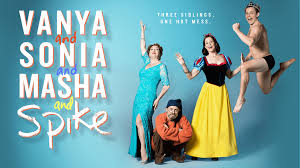 Perhaps this rush to the familiar and popular and NYC-annointed is disheartening, but it’s worth observing that the American Theatre list notes how many productions each title gets, and that after the first couple of slots, we’re usually looking at plays that are getting 7 or 8 productions in a given season, across TCG’s current universe of 474 member companies (404 of which were included in this year’s figures). Since the magazine notes a universe of 1,876 productions, suddenly 27 stagings of a single show doesn’t seem so dominant after all. Granted, TCG drops Shakespeare from their calculations, but even he only counted for 77 productions of all of his plays across this field. So reading between the lines, the American Theatre list suggests there’s very little unanimity about what’s done at TCG member theatres in any given year, a less quantifiable achievement but an important one.
Perhaps this rush to the familiar and popular and NYC-annointed is disheartening, but it’s worth observing that the American Theatre list notes how many productions each title gets, and that after the first couple of slots, we’re usually looking at plays that are getting 7 or 8 productions in a given season, across TCG’s current universe of 474 member companies (404 of which were included in this year’s figures). Since the magazine notes a universe of 1,876 productions, suddenly 27 stagings of a single show doesn’t seem so dominant after all. Granted, TCG drops Shakespeare from their calculations, but even he only counted for 77 productions of all of his plays across this field. So reading between the lines, the American Theatre list suggests there’s very little unanimity about what’s done at TCG member theatres in any given year, a less quantifiable achievement but an important one.
Dramatics
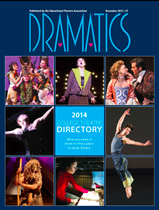 While titles come and go on the American Theatre list, stasis is the best word to describe the lists of most produced high school plays (it’s somewhat less true for musicals). Nine of the plays on the 2014 list were on the 2013 list; 2014 was topped by John Cariani’s Almost, Maine, followed by A Midsummer Night’s Dream and the two titles were in reverse order the prior year. The other duplicated titles were Our Town, 12 Angry Men (Jurors), You Can’t Take It With You, Romeo and Juliet, The Crucible, Harvey and The Importance of Being Earnest.
While titles come and go on the American Theatre list, stasis is the best word to describe the lists of most produced high school plays (it’s somewhat less true for musicals). Nine of the plays on the 2014 list were on the 2013 list; 2014 was topped by John Cariani’s Almost, Maine, followed by A Midsummer Night’s Dream and the two titles were in reverse order the prior year. The other duplicated titles were Our Town, 12 Angry Men (Jurors), You Can’t Take It With You, Romeo and Juliet, The Crucible, Harvey and The Importance of Being Earnest.
Like the American Theatre list, the Dramatics survey doesn’t cover the entirety of high school theatre production; only those schools that are members of the Educational Theatre Association’s International Thespian Society have the opportunity to participate, representing more than 4,000 high schools out of a universe of 28,500 public, private and parochial secondary schools in the country. Unlike the Dramatics list, there are no hard numbers about how many productions each show receives, so one can only judge relative popularity.
 Almost, Maine’s swift ascension to the top rungs of the list is extraordinary, but it’s due in no small part to its construction as a series of thematically linked scenes, originally played by just four actors but easily expandable for casts where actor salaries aren’t an issue. Looking at recent American Theatre lists, they tend to be topped by plays with small casts (Venus in Fur, Red, Good People and The 39 Steps), while the Dramatics list is the reverse, with larger cast plays dominating, in order to be inclusive of more students (though paling next to musicals where casts in school shows might expand to 50 or more).
Almost, Maine’s swift ascension to the top rungs of the list is extraordinary, but it’s due in no small part to its construction as a series of thematically linked scenes, originally played by just four actors but easily expandable for casts where actor salaries aren’t an issue. Looking at recent American Theatre lists, they tend to be topped by plays with small casts (Venus in Fur, Red, Good People and The 39 Steps), while the Dramatics list is the reverse, with larger cast plays dominating, in order to be inclusive of more students (though paling next to musicals where casts in school shows might expand to 50 or more).
The most important trend on the Dramatics list (which has been produced since 1938) is the lack of trends. Though a full assessment of the history of top high school plays would take considerable effort, it’s worth noting that Our Town was on the list not only in 2014 and 2013, but also in 2009, 1999 and 1989; the same is true for You Can’t Take It With You. Other frequently appearing titles are Arsenic and Old Lace, various adaptations of Alice in Wonderland, Harvey, and The Miracle Worker.
No doubt the lack of newer plays with large casts is a significant reason why older classic tend to rule this list; certainly the classic nature of these works and their relative lack of controversial elements play into it as well. But as I watched Sheri Wilner’s play Kingdom City at the La Jolla Playhouse a few weeks ago, in which a drama director is compelled to choose a play from the Dramatics list, I wondered: is the list self-perpetuating? Are there numerous schools that seek what’s mainstream and accepted at other schools, and so do the same plays propagate themselves because administrators see the Dramatics list as having an implied educational seal of approval?
That may well be, and if it’s true, it’s an unfortunate side effect of a quantitative survey. But it’s also worth noting that many of these plays, vintage though they may be, have common themes, chief among them exhortations to march to your own drummer, to matter how out of step you may be to the conventional wisdom. They may be artistic expressions from other eras about the importance of individuality, but in the hands of teachers thinking about more than just placating parents, they are also opportunities to celebrate those among us who may seem different or unique, and for fighting for what you believe in against prevailing sentiment or structures.
* * *
Looking at musicals on the American Theatre list is a challenge, because their list is an aggregate of plays and musicals, and while many regional companies now do a musical or two, it’s much harder for any groundswell to emerge. In the last five years, only three musicals have made it onto the TCG lists, each for one year only: Into The Woods, Spring Awakening and The 25th Annual Putnam County Spelling Bee. That doesn’t mean there’s a dearth of musical production, it simply shows that the work is being done by companies outside of the TCG universe.
 Musicals are of course a staple of high school theatre, but the top ten lists from Dramatics are somewhat more fluid. While staples like Guys and Dolls, Grease, Once Upon a Mattress, You’re A Good Man Charlie Brown and Little Shop of Horrors maintain their presence, newer musicals arrive every year or two, with works like Seussical, Legally Blonde, Spelling Bee, and Thoroughly Modern Millie appearing frequently in recent years. At the peak spot, after a six-year run, Beauty and the Beast was bested this year by Shrek; as with professional companies, when popular new works are released into the market, they quickly rise to the top. How long they’ll stay is anyone’s guess, but I have little doubt that we’ll one day see Aladdin and Wicked settle in for long tenures.
Musicals are of course a staple of high school theatre, but the top ten lists from Dramatics are somewhat more fluid. While staples like Guys and Dolls, Grease, Once Upon a Mattress, You’re A Good Man Charlie Brown and Little Shop of Horrors maintain their presence, newer musicals arrive every year or two, with works like Seussical, Legally Blonde, Spelling Bee, and Thoroughly Modern Millie appearing frequently in recent years. At the peak spot, after a six-year run, Beauty and the Beast was bested this year by Shrek; as with professional companies, when popular new works are released into the market, they quickly rise to the top. How long they’ll stay is anyone’s guess, but I have little doubt that we’ll one day see Aladdin and Wicked settle in for long tenures.
* * *
When I looked at both the American Theatre and Dramatics lists over a span of time, the distinct predictability of each was troubling. Coming out when they do, before most theatrical production for the next theatre season is set, I’d like to see them looked at not as any manner of affirmation, but as a challenge – whether to professional companies or school schedules. I admire and enjoy the plays that are listed here, and nothing herein should be construed as critical of any of these shows; audiences around the country deserve the opportunity to see them. While I do have the benefit of living in New York and seeing most of these popular shows there, I must confess that I am most intrigued by the theatre companies and school groups that might just say to themselves, ‘Let’s not do the shows, or too many of the shows, that appear on these lists. Let’s find something else.’ Those plays may never appear as part of any aggregation, but I suspect the groups’ work will be all the more interesting for it, benefiting both artists and audiences.
![]() In a week when flaws in Rolling Stone’s reporting of a culture of rape on the University of Virginia campus created national headlines, the lapses of a single cultural reporter at the Wall Street Journal doesn’t seem to amount to a hill of beans. But it’s a story that is much buzzed about in theatrical circles, and perhaps throughout the field of the arts, with implications much greater than Joanne Kaufman’s self-appointed role as a serial “Broadway bolter,” who has accepted who knows how many complimentary tickets only to depart frequently at intermission.
In a week when flaws in Rolling Stone’s reporting of a culture of rape on the University of Virginia campus created national headlines, the lapses of a single cultural reporter at the Wall Street Journal doesn’t seem to amount to a hill of beans. But it’s a story that is much buzzed about in theatrical circles, and perhaps throughout the field of the arts, with implications much greater than Joanne Kaufman’s self-appointed role as a serial “Broadway bolter,” who has accepted who knows how many complimentary tickets only to depart frequently at intermission. Now it’s important to note that in my circles, both personal and online, there seems to be little sympathy or tolerance for Kaufman’s recurring disappearing act. Other journalists have shot verbal arrows at her on Twitter, as have theatre professionals from every discipline in the field. She has been the subject of nothing less than ongoing ridicule, and she’s likely to be a longtime theatre punchline. Publicist Rick Miramontez (a friend and professional colleague) has had a blog post in which he calls out Kaufman go viral, in part because he lays bare her failings and also because many assume that p.r. people will kowtow to the media at all costs.
Now it’s important to note that in my circles, both personal and online, there seems to be little sympathy or tolerance for Kaufman’s recurring disappearing act. Other journalists have shot verbal arrows at her on Twitter, as have theatre professionals from every discipline in the field. She has been the subject of nothing less than ongoing ridicule, and she’s likely to be a longtime theatre punchline. Publicist Rick Miramontez (a friend and professional colleague) has had a blog post in which he calls out Kaufman go viral, in part because he lays bare her failings and also because many assume that p.r. people will kowtow to the media at all costs. On the same subway ride during which I read Kaufman’s piece, I also read an essay by Tim Walker, who has recently been let go from his position as theatre critic for London’s Sunday Telegraph. Understandably troubled by the ongoing culling of arts critics in London (an issue in the U.S. as well, and a concern I share), he cites a conversation about criticism he recently had:
On the same subway ride during which I read Kaufman’s piece, I also read an essay by Tim Walker, who has recently been let go from his position as theatre critic for London’s Sunday Telegraph. Understandably troubled by the ongoing culling of arts critics in London (an issue in the U.S. as well, and a concern I share), he cites a conversation about criticism he recently had:
















































